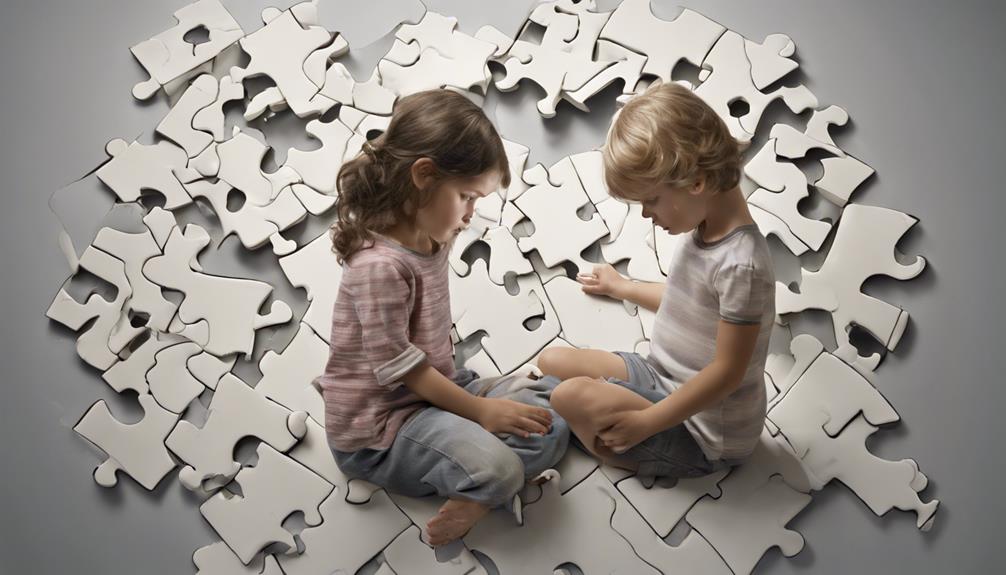In our effort to find ways to help children as they face the difficulties of divorce, it is crucial to prioritize their emotional well-being through promoting stability and encouraging open communication.
By implementing kid-friendly approaches such as encouraging expression of feelings and maintaining a sense of security, we can help children navigate this challenging period successfully.
But what other practical methods can be utilized to support children through this difficult transition?
Key Takeaways
- Encourage open communication to validate children's feelings and strengthen parent-child bonds.
- Establish consistent routines and provide physical closeness for stability and reassurance.
- Promote healthy coping mechanisms through activities, routines, and relaxation techniques.
- Seek professional guidance if needed to support children's emotional well-being during the divorce process.
Understanding Children's Emotions
As parents navigating a divorce, it's crucial to recognize and address the range of emotions our children may be experiencing. Children going through a divorce may feel a whirlwind of emotions like shock, uncertainty, and anger. This significant change can be akin to a profound loss for them, leading to feelings of grief and hardship.
It's vital to encourage our children to express their emotions freely and to listen attentively to how they're feeling. Many children may wrongly believe they're the cause of the divorce, highlighting the importance of providing clarification and reassurance. By acknowledging and validating our children's feelings, we can build trust and understanding during this challenging time.
Let's create a safe space where our children feel comfortable expressing their emotions, knowing that we're here to support them every step of the way.
Building a Supportive Environment

Creating a nurturing environment for our children during a divorce involves maintaining consistent routines to provide stability and comfort. As parents, it's essential to help our children feel secure and supported during this challenging time. Here are some ways we can build a supportive environment for our child:
- Establishing Clear Expectations: Setting boundaries and clear expectations can help children feel more secure and know what to expect, providing them with a sense of stability in their changing world.
- Offering Physical Closeness and Affection: Physical touch and expressions of love can reassure children of our unwavering support and care, helping them feel safe and connected despite the changes they're living through.
- Providing Reassurance of Love and Care: Remind your child frequently that they're loved, valued, and cared for. This reassurance can ease their anxiety and help them navigate their emotions and mental health during this time of transition.
Encouraging Open Communication
To foster a strong connection and emotional well-being for children going through divorce, encouraging open communication is vital. It's essential to let children feel that they've a safe place to express their thoughts and emotions during this challenging time.
By providing a supportive environment where kids can openly communicate, we're helping children cope with the changes brought about by divorce. Reassuring children that their feelings are valid and that they can talk about anything they need to is crucial.
Divorced parents should make time to listen actively, answer questions honestly, and tell kids that it's okay to feel whatever they're feeling. Open communication helps children process their emotions, understand the situation better, and strengthens the bond between parents and children.
Establishing Healthy Coping Mechanisms

Encouraging children to explore and utilize healthy coping mechanisms is crucial in helping them navigate the challenges of divorce with resilience and emotional stability. It's normal for children to feel a range of emotions during this time, and providing them with effective coping strategies can make a significant difference.
Here are some ways to help your kids cope:
- Create Opportunities to Spend Time: Encourage your children to engage in activities they enjoy and spend time with supportive friends or family members. This can help distract them from negative feelings and provide a sense of normalcy.
- Establish a Consistent Routine: Having a predictable schedule can help children feel secure and in control amidst the changes happening due to the divorce. Include healthy activities like exercise and hobbies to promote overall well-being.
- Teach Healthy Coping Mechanisms: Introduce relaxation techniques such as deep breathing or mindfulness to help your children manage stress and anxiety. Encouraging open communication and providing a safe space for them to express their feelings is also essential in fostering resilience. Remember, your support is key in helping them navigate this challenging time.
Seeking Professional Guidance if Needed
If your child is struggling to cope with the emotional challenges of divorce, seeking professional guidance can provide them with valuable tools and support to navigate this difficult time. Trained mental health professionals, like child psychologists, offer strategies to support children's well-being during the divorce process.
Through therapeutic interventions, children can express their feelings, manage anxiety, and understand the impact of divorce on their lives. These professionals play a crucial role in helping children process their emotions and develop healthy coping mechanisms post-divorce.
Frequently Asked Questions
How Can a Child Deal With Divorce?
We can help children deal with divorce by openly discussing their feelings, providing love and reassurance, maintaining routines, encouraging communication, and clarifying misconceptions. Reminding them they're not to blame can alleviate guilt and foster understanding.
What Are Coping Methods for Helping Children Adjust to Divorce?
Adjusting to divorce can be tough for kids. We prioritize honest conversations, stable routines, and constant reassurance to navigate this journey together. Your children's well-being is our focus, and we're here to support them.
At What Age Is a Child Most Affected by Divorce?
We believe children around ages 10 to 12 might be most affected by divorce. Emotions like anger and confusion can intensify. Understanding each child's unique response is crucial. We're here to support and guide you through this challenging time.
What Is Most Important in Helping Children Cope With Divorce?
Supporting our children through divorce is crucial. We prioritize open communication, reassurance, and stability. By acknowledging feelings, validating emotions, and clarifying it's not their fault, we build trust and understanding for their emotional well-being.
How Can Coping Strategies for Divorce Also Benefit Children’s Health?
When it comes to raising healthy children after divorce, coping strategies can have a positive impact on their well-being. Children can benefit from seeing their parents effectively manage stress and conflict, as it can lead to a more stable environment and foster resilience in the face of adversity.
Conclusion
As we navigate the turbulent waters of divorce with our children, let's remember to be their anchors in the storm. Just like a lighthouse guides ships safely to shore, our love and support can help them find their way through the darkness.
Together, we can weather this storm and emerge stronger on the other side. Stay strong, stay loving, and remember, we're in this together.










